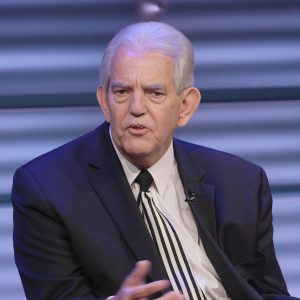Melony Armstrong did not grow up financially disadvantaged, She didn’t suffer an accident that left her disabled. She didn’t make any poor decisions that ended her up in the criminal justice system.
An African-American girl growing up in Mississippi in the 1970s, Armstrong went to college and had a successful career in the field of psychology. She was a model for living the American dream.
But when she decided to strike out on her own, Armstrong confronted enormous, institutional barriers to opportunity that she never expected — state and municipal bureaucracy so entrenched that it became nearly impossible for her to open and own a small business.
The barrier was “a direct result of how our state and local governments regulate what people do for work and how those barriers slam the door to opportunity for many people in a very real way,” she told an audience in Washington, D.C., attending an AEI Vision Talk.
Armstrong, who grew up having her mother and grandmother braid her hair every weekend, part of a rich cultural heritage that dates back 3,000 years, wanted to become a professional hair braider and took the logical course of action in that direction — training under a master braider and practicing for six months on a mannequin.
“I dreamed of becoming an entrepreneur and opening and running my own hair braiding business. The dream got my adrenaline pumping,” she said.
But when she finally felt ready to employ her new talents, the nightmare began. Armstrong found that the state Board of Cosmetology required that anyone who wanted to become a natural hair braider had to take 1,500 hours of cosmetology school and had to pay the state more than $10,000 for the license.
The requirements were “going to all be in an area that literally had nothing to do with hair braiding.”
To obtain a license to teach hair braiding, part of Armstrong’s long-term business plan, would require an additional 3,200 hours of classes.
“I could have become licensed in all of the following occupations in Mississippi. Here we go: emergency medical technician-basic, emergency medical technician-paramedic, ambulance driver, police officer, firefighter, real estate appraiser, and hunting education instructor,” she said. “Not just one of those occupations, but all of those occupations, I could have (done) them all and still had 600 hours left over.”
Working her way through the labyrinth of state government, Armstrong learned that the state Board of Cosmetology, which made up the licensing requirements and granted the licenses, was comprised of practicing cosmetologists.
“What this meant for cosmetology schools is that cosmetology schools would be guaranteed students, right? Once they were guaranteed students, then basically these students became captive customers, and so anyone wanting to do this, there was no way that you could get around it. You had to go to a cosmetology school, you had to take the training, and you had to pay for the training in order to become licensed.”
Armstong said she had to make a decision: either give up on her dreams or fight the status quo. “I decided to fight back.”
Getting wind of Armstrong’s predicament, the Institute for Justice took up her cause and filed a lawsuit on her behalf. This meant weekly, and sometimes thrice-weekly trips to Jackson, the state capital, which is seven hours round-trip from her hometown of Tupelo.
Years later and facing down some incredible odds, including trying to explain hair-braiding techniques to male lawmakers and being challenged at one point about whether hair braiding could raise the risk of HIV, which it cannot, the state legislature overturned the elaborate requirements, and the governor signed the new law. Now, the only requirements for hair braiders in Mississippi is to pay a fee, register with the state board of health, and abide by basic health and sanitation guidelines.
That was in 2005. Today, over 3,000 people are registered hair braiders in Mississippi, and Armstrong has taught hundreds of individuals how to braid hair through her school, Armstrong Academy. She has also opened up Melony Armstrong Coaching and Consulting.
“There only needed to be one tweak in the law, and that one tweak in the law has affected thousands of women in Mississippi,” she said, adding that regulatory hurdles have also been eased in Alabama, Arkansas, Texas, and Utah as a result of the change in Mississippi.
So what is the lesson that Armstrong shares from her experience?
“I think we need to take a serious look at the regulatory walls that are barring entrepreneurs from making an honest living. … We owe it to our citizens to pay attention to these laws that do nothing but keep entrepreneurs out,” she said. “America was built on the backs of entrepreneurs. I think many people would agree that we need entrepreneurs. Entrepreneurs made America great, and if we could do it in Mississippi, we can do it across the nation.”






